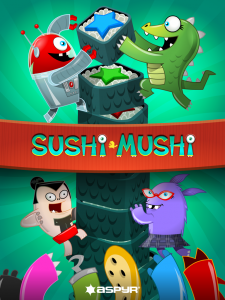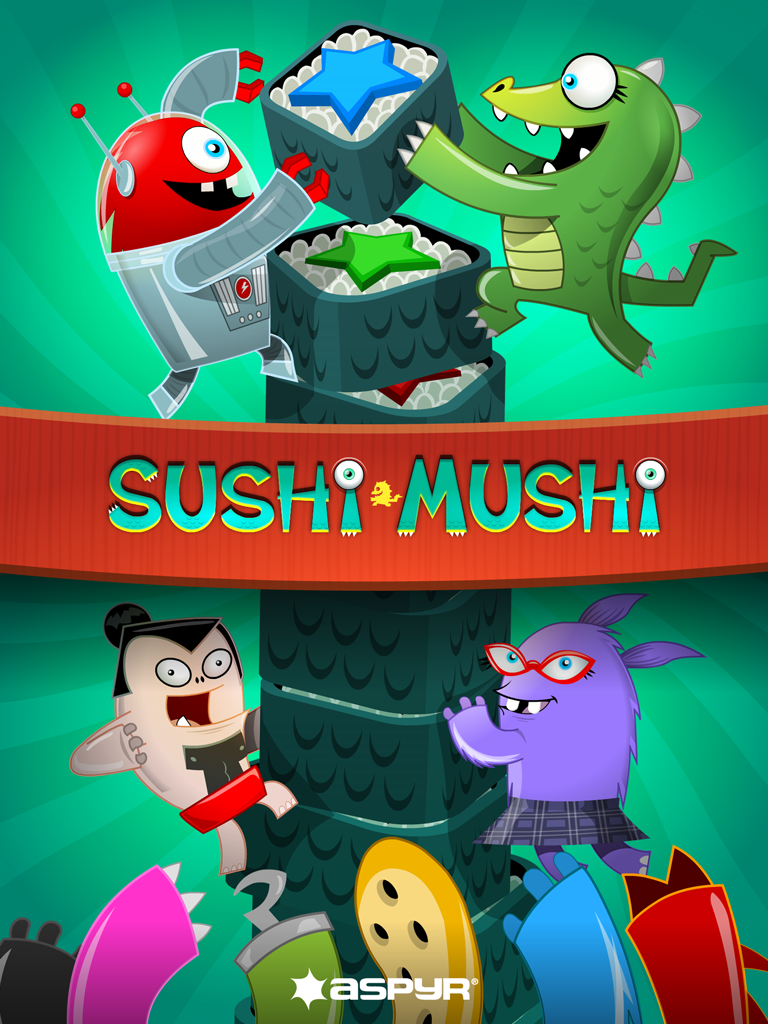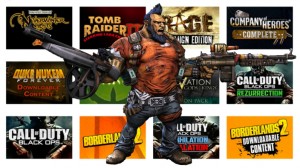Today’s interesting interviews comes from Scott White of Aspyr Media, Inc. Aspyr Media is most known as a company that ports games to the Mac, however since 2008 they’ve delved into making their own games. Their most recent game, Sushi Mushi, is an awesome game and is FREE to download. They will be releasing an update soon that includes six new monsters and fixes some of the current features. We want to thank Scott and everyone at Aspyr Media for taking the time out to do this interview. Download Sushi Mushi or, if you feel hesitant, read our review of it, then go download it!
Can you tell us a little about yourself(s)?
I am the Studio Director for IP at Aspyr Media, Inc. I have been making video games for over 16 years and have made over 50 games for brands like Spiderman, Barbie, NASCAR, Disney, and X-Men. Just over five years ago I came to Aspyr Media to head up their new intellectual property studio. And it has been a kick-in-the-pants ever since.
What is the story behind the name Aspyr?
I was not here at Aspyr Media when they named the company. But legend has it that the founders wanted to name the company Aspire (to seek higher goals to achieve something); but that url was taken. So they adapted the spelling to “Aspyr”. Unfortunately many people pronounce is “Assper”. Whichever way you say the name, just know that Aspyr brings some of the biggest and best games to the Mac.
Can you tell us a little bit about your team? How many core members? How long have you known each other? What brought you all together?
Aspyr Media, as a company, licenses and develops AAA games for the Mac OS. For instance they license games like Civilization, Call of Duty, Roller Coaster Tycoon, then natively port it to the Mac and then publish the games under the Aspyr brand. I run a small 3-4 person skunk-works studio within Aspyr that develops our own original IP for the iOS platform. The members of my team have all worked together for just over five years now.
What would you look for in new team members?
I look for creative and opinionated individuals that are not afraid to push the boundaries. They cannot have big egos and when their ideas or opinions are rejected they get back up and try again. And we all have to play well together of course. Nothing worse than a team member with an attitude. When you are spending more time together than you do with your own family for many weeks at a time then you try and cut down on sour personalities. I would always prefer a knowledgeable and skilled team member, but if it comes at the cost of sulking or rants then I will take a less skilled worker any day. I know, I sound like a Dad here but it is true in all walks of life. Good character and resilience matter more than a superstar that acts like a three year old.
What inspired you to jump into the gaming industry?
My educational background was in graphic design for advertising. But print and TV advertising media felt too limited. I wanted to tell stories and create experiences in a more engaging way. I moved into digital media on the business side of things back in the mid-90s. At that time I built interactive experiences for companies like National Geographic, Discovery Channel, WalMart, AMD, IBM, etc. But just a few cubicles away they had a games division. In all honesty it looked like they were having more fun so I worked my way over there. And now that I have been making games for over 16 years I can say that they were having more fun. What I like about the game industry is the process of getting highly creative and smart people together and seeing what comes out of the chaos.
What advice would you give to someone wanting to get into the gaming industry?
Diversify. I will touch on this with the next question a bit more. But in short, get to know every aspect of the game industry, and there are a lot. Do not specialize early on and think that you will be happy animating characters for the rest of your life. You need to know how games are programmed, designed, developed, published, marketed, etc. You don’t have to know everything but you should know enough to be dangerous.
How do you feel about the recent popularity and subsequent proliferation of game development schools?
I have mixed feelings about these programs. I think they are great for people that know exactly what they want to do and cannot think of anything else night and day. But I find, for most people, that College courses give you the knowledge to eliminate what you do NOT want to do as much as inform you what you DO want to do. When young adults are signing up for these programs they are in transition in life where they need to find themselves. They need to diversify their options. A concentrated program that is exclusive to game development can be harmful if, say, someone finds that after a couple of years they do not like making games or they find something better. They are painting themselves into a corner. And even after many years of making games there is a fair chance they want to do something else that, educationally, they are not qualified to do. They are limiting their options. Game development is an industry that is hard to crack but it also has a high fallout rate. So keep in mind that of the 100 individuals that were in my first game company about 30 of them are still making games. Don’t get me wrong; making games is fun to do. But when you are working LONG hours and every weekend for months at a time and you see your neighbor who gets home at 5:30 every day you realize that it takes a LOT of sacrifice.
Can you tell us a bit about your background in game design?
I do not really consider myself to be a game designer, more of a game maker. The nuance seems trite but it is big to me. I deal in decisions for technology even though I am not a programmer. Just as I deal in decisions on scope, timelines, process, art, audio, marketing, distribution, and salaries. So basically I dabble in game design. The way I run my teams is to empower every team member to make game design decisions and I make the final calls. I parse through ideas, bring the best to the forefront, set goals, and then massage it all the way to the finish line.
What was the inspiration for Sushi Mushi?
 My team had just finished our first iOS game Poker Pals (published by Chillingo). And we came off that game with a lot of new knowledge and with a few cuts and bruises. But I am bullish on multiplayer asynchronous games. So I set my studio with a challenge: to make a casual game using what we had learned. There were more challenges but I won’t go into those. And we played lots of board games and card games. In the end it came down to the question “How can we take the match-three puzzle mechanic like Bejeweled and make it two-person competitive?” So you could say that games like Bejeweled are the inspiration. After that we wrapped a fun theme around the basic gameplay: monsters and sushi. Just because monsters and sushi go together like milk and cookies. Am I right?
My team had just finished our first iOS game Poker Pals (published by Chillingo). And we came off that game with a lot of new knowledge and with a few cuts and bruises. But I am bullish on multiplayer asynchronous games. So I set my studio with a challenge: to make a casual game using what we had learned. There were more challenges but I won’t go into those. And we played lots of board games and card games. In the end it came down to the question “How can we take the match-three puzzle mechanic like Bejeweled and make it two-person competitive?” So you could say that games like Bejeweled are the inspiration. After that we wrapped a fun theme around the basic gameplay: monsters and sushi. Just because monsters and sushi go together like milk and cookies. Am I right?
How long did it take to make Sushi Mushi?
We spent six weeks in prototype and 3.5 months in development for the initial release. After releasing we spent about six additional weeks on an update that includes what we learned from v1 plus a lot of features that were cut from the initial game.
What is the most challenging part of making a new game?
Getting started. When you are playing with an open box of ideas and possibilities you tend to freeze and overanalyze. What about this idea and why is it better than that idea? At the end of the day you just have to pick one and sprint to the end without fear. It sounds so easy but when dealing with a blank slate for every new game it can be quite intimidating. Especially when lots of people are looking over your shoulder and wondering why you have made each decision.
The second hardest part of making a game is designing for simplicity. As in, the simplest games are some of the hardest to make.
You’re coming out with a new update on the game that makes the gameplay simpler. What led you to this decision? Personally, I loved the feed and rob rolls.
It was not an easy decision to remove the power to rob from your opponent. Lots of people like this. When making games I feel that you cannot be fearful of making drastic changes, even if some players are disappointed. In the end it has to do with my answer to the previous question – I felt that we needed to simplify everything. As I watched people play Sushi Mushi most players did not get the feeding and robbing until they played about five full games. That is fail number one. After that it was fun for them until they played advanced players. At which time sushi was rarely left on the plate and rob rolls were somewhat useless. That is fail number two. The third reason was that it took a lot of explaining through animation and UI to get it across to the player. So I decided to simplify everything.
There are still Rob and Feed rolls but they are now called Shape and Color rolls. And they give some pretty good bonus points so if you were good at collecting them then you will still rise to the top.
You’ve worked in partnership with many large companies to bring popular games to the Mac. What led you to develop your own game?
Every company aspires (Aspyrs) to develop their own intellectual property. For us, in the end it is a decision to control our own destiny. With our own games we can take them to new platforms without going through contract negotiations and permissions with other publishers. We can build sequels, test out new markets, and try new ideas. We are only beholden to our shareholders and ourselves. In the end we hope to be proud of the craftsmanship and creativity that comes from making something you built with your own hands from scratch.
How does it feel to have Sushi Mushi still being discovered and loved by new fans on the app store?
It is a great feeling to know that people are enjoying what you have created. That it is making them smile, grimace, and think. And to know that they are competing with friends and using your game as a foundation to their conversation is icing.
How does it feel when people you know are playing your games?
This is a funny one. On one hand I love it and it is humbling that they take the time. There are a million and one ways they could be spending their time and the fact that they are spending their precious time with my game is great. But on the other hand it is difficult to take criticism from those you know, even if it is given in love. It is a lesson in humility when my mother-in-law, for example, explains to me what needs to change. And no, she did not tell me to remove roll robbing in case you were wondering. I have to constantly remember that friends and family are offering advice because they care.
Can you explain your process of making a game?
I first define the sandbox so that we do not either freeze up from the endless possibilities or go hog-wild with a game we cannot make or afford. The sandbox is comprised of goals, target demographic, genre, platform, budget, timeline, comparables, etc. Next step is to play it by paper testing if at all possible. For Sushi Mushi we bought a board game called Qwirkle, great game by the way, and used the pieces to help define the number of colors and shapes. To tell us how big the board should be and how many sushi combinations and chains could be collected. We then moved to a working prototype on an iPhone. Always prototype to the hardest problem. It is easier to prototype a puzzle game for an iPad because of the large screen. But to fit it all on the iPhone is a bigger challenge. And the purpose of a prototype is to fail early and fail often. This process separates the gold from the impurities. After that we greenlight the good prototypes and document the design, flowcharts, budget, timeline, etc. And then start the long slog of developing.
What programs do you use to make your games?
The code is in Objective C, the native language of the iOS. Other software tools we use are Photoshop, Illustrator, Flash, AfterEffects, Excel, Word, Google Docs, and a few others. For 3D games we include some extras like Maya and Unity.
How hard is it to submit a game for approval in the iOS app store?
It is not all that difficult. The license only costs $100/yr. With that you get access to publishing on the App Store, tools and tons of resources. I am fortunate that I have a really good QA team here at Aspyr and they test the builds extensively. So getting through Apple approval has not been a big problem for us. I think that where most developers run into problems is that they do not test their game enough and release with a lot of bugs, if Apple even lets them release.
How do you feel about the iOS app store? Pros/cons, challenges?
For a digital store that allows for innovation and creativity it is great. As long as you follow Apples rules, which are all pretty much common sense, you can make a game that has the potential to be seen by millions. But therein is the conundrum. It is open to anyone to publish. So it gets crowded with both great games and poor games; the end-user is presented with too many options. And the cream does not always rise to the top.
Not talking about Sushi Mushi here, but tons of games that I have found when digging have been incredible games and they have a download rate of about 2,000 downloads. So discoverability is the biggest problem with the App Store. How do you find what you are looking for?
The other problem is the price people are willing to pay in the App Store. Games that cost $1M to make are being forced to sell for $0.99 or for free because the audience has now been trained to pay more for a pack of chewing gum than for hours of entertainment; while the cost to advertise and acquire a new user runs anywhere from $1.80 – $3. Not necessarily a bad thing but it has caused developers to rethink monetization. And when that happens developers spend more time on how to make their money back and less on content.
What improvements do you think can be made to improve the app store?
Once again, discoverability. How can a user find what they are looking for? The answer app developers use currently often goes like this: Tiny Towers comes out and does awesome. Then you see a glut of games called Tiny something-or-other. They do this because when people search for Tiny Towers they will show up in the search. The downside is that games are starting to all sound the same and they lack their own individuality.
How worried are you about other developers cloning your work?
I rarely find any game out there that is not a clone in some form or fashion of another game. You could even say that Sushi Mushi is “clone-like” of Bejeweled. And Bejeweled is a “clone-like” of another game. So there are degrees of cloning everywhere and it is a very grey area. Now to answer your direct question, yes and no. Yes, I wish that developers would not clone so closely; that they would use their own creative juices and blaze their own path. But in the end it will happen and I have to take the attitude of “if they clone then I have something worth cloning”. It is a fact of the industry that it will happen. You can either moan about it or move on.
Can you explain your thoughts on in-app purchases?
This gets back to an earlier answer about the pros and cons of the App Store. It has become a necessary part of App Store development; how to get paid in a low-priced economy. I like it because I can get paid, I do not like it because in order to accommodate, it takes away from the final game in content and often quality.
What apps do you enjoy playing?
Off-Road Legends, Catapult King, Crazy Coaster, and Puzzle Agent to name a few.
What else does the staff play/ do for fun when not making a game?
Personally I like to go fishing and hunting. Really anything to get away from a computer and spend time with the kiddos outdoors. Others on the team like to exercise, go to movies and see local bands play.
What App companies do you look to as an example?
I admire what Telltale Games is doing to storytelling within games, what ZeptoLab has done for puzzle games in Cut the Rope, and the sheer visuals and innovative gameplay by Simogo in Bumpy Road and Sneak Bandit.
How do you see the world of App development evolving?
 App Development is moving from small shops hitting big wins to big publishers squeezing out small competition. Players only have so much time in the day to play their games. They have to be selective. When the big publishers spend large amounts of money acquiring users then teams with low development dollars will lose out. This is good and bad for the end-consumer. It is good because the quality of apps they see will be much greater. It is bad because they will not get to experience the true innovation that comes with high-risk ideas.
App Development is moving from small shops hitting big wins to big publishers squeezing out small competition. Players only have so much time in the day to play their games. They have to be selective. When the big publishers spend large amounts of money acquiring users then teams with low development dollars will lose out. This is good and bad for the end-consumer. It is good because the quality of apps they see will be much greater. It is bad because they will not get to experience the true innovation that comes with high-risk ideas.
As for a global perspective App development, or development for smartphones or TV, is where the biggest growth will be for games in the coming years. And you will see all kinds of experimentation with monetization schemes. I also think that large household brands will be moving into the game app space en-masse.
At what point did you feel a game is ready to be put up on the app store?
We work on a very strict schedule and budget. So I do not have the luxury to publish only when it is ready. In the end it is ready when the schedule says it is ready. If that point happens before I want to release the game then I cut non-essential features. For Sushi Mushi you will see several new systems that were not in the original release because they were cut.
What is your dream type of game to make someday?
There is a game and story idea that I have been working off-and-on for about seven years. It has come and gone through the years because the timing and platforms were not quite right. Funny thing, we just finished up an early prototype for it last week. So all I can say now is that if we greenlight it, I will soon be working on my dream game.
What is your favorite snack when making a game?
Chewing gum.
Can you tell us a little more about what else we can be expecting from you?
We are ramping up to develop more games for more game genres all on the iOS. So you can expect to see a lot more from Aspyr within the next six months. And hopefully my dream game will be coming soon.
Anything else you would like to share with us?
Thank you for the opportunity to discuss my thoughts and reading all the way to the end.










